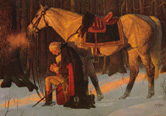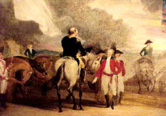Since Sept. 11, Americans have seen a resurgence of patriotism. In honor of the Presidents Day national holiday, UNMC Today has shared the words and images of Presidents George Washington and Abraham Lincoln. Today’s final selections highlight Washington’s thoughts after the revolution and his plan for government.
Washington’s thoughts after the revolution
 Following the Revolution, the young American colonies did not have a clear direction for the future government. In response to this situation, General Washington wrote the following account to John Hancock (who was then president of the Provincial Congress of Massachusetts and on record as the first member of the Continental Congress to sign the Declaration of Independence):
Following the Revolution, the young American colonies did not have a clear direction for the future government. In response to this situation, General Washington wrote the following account to John Hancock (who was then president of the Provincial Congress of Massachusetts and on record as the first member of the Continental Congress to sign the Declaration of Independence):
“There are four things, which I humbly conceive are essential to the well being, I may even venture to say, to the existence of the United States, as an Independent Power– 1st, an indissoluble Union of the States under one Federal Head. 2nd, a sacred regard to public Justice. 3rd, the adoption of a proper Peace Establishment, and 4th, the prevalence of that pacific and friendly disposition among the People of the United States, which will induce them to forget their local prejudices and policies, to make those mutual concessions which are requisite to the general prosperity, and in some instances, to sacrifice their individual advantages to the interest of the community…” (June 11, 1783).
Washington’s plan for government
 After the American Revolution ended it soon became evident that the newly formed states could not survive as independent entities. This led to the formation of a plan for governing which ultimately became known as the Constitution of the United States. Prior to the Constitutional Convention at Independence Hall in Philadelphia, Washington, who later became president of the convention, wrote the following words to James Madison (a Virginia legislator who later became known as the Chief Architect of the Constitution and the fourth president of the United States):
After the American Revolution ended it soon became evident that the newly formed states could not survive as independent entities. This led to the formation of a plan for governing which ultimately became known as the Constitution of the United States. Prior to the Constitutional Convention at Independence Hall in Philadelphia, Washington, who later became president of the convention, wrote the following words to James Madison (a Virginia legislator who later became known as the Chief Architect of the Constitution and the fourth president of the United States):
“What stronger evidence can be given of the want of energy in our governments than these disorders? If there exists not a power to check them, what security has a man of life, liberty, or property? To you, I am sure I need not add aught on this subject, the consequences of a lax, or inefficient government, are too obvious to be dwelt on. Thirteen Sovereignties pulling against each other, and all tugging at the federal head, will soon bring ruin on the whole; whereas a liberal, and energetic Constitution, well guarded and closely watched, to prevent encroachments, might restore us to that degree of respectability and consequence, to which we had a fair claim, and the brightest prospect of attaining…” (Nov. 5, 1786).
Top image: Washington’s prayer at Valley Forge. Image by Arnold Friberg, 1973. Bottom image: The surrender of Lord Cornwallis at Yorktown. Oil on canvas by John Trumbull, 1787.